Unit 1 The king's new clothes 课件(21张PPT)
文档属性
| 名称 | Unit 1 The king's new clothes 课件(21张PPT) | 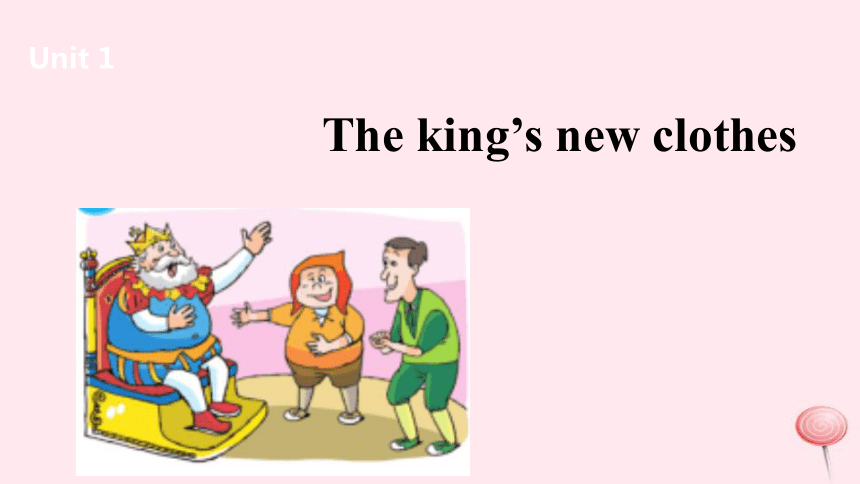 | |
| 格式 | zip | ||
| 文件大小 | 1.3MB | ||
| 资源类型 | 教案 | ||
| 版本资源 | 牛津译林版 | ||
| 科目 | 英语 | ||
| 更新时间 | 2019-08-15 11:04:39 | ||
图片预览

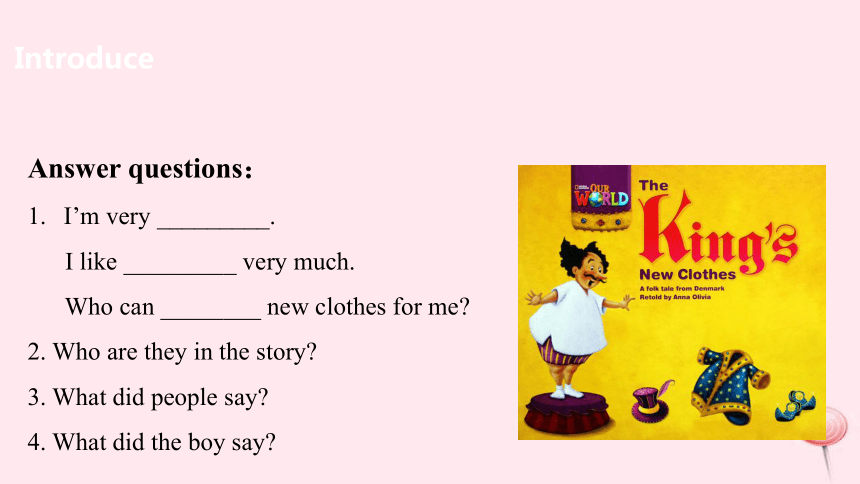
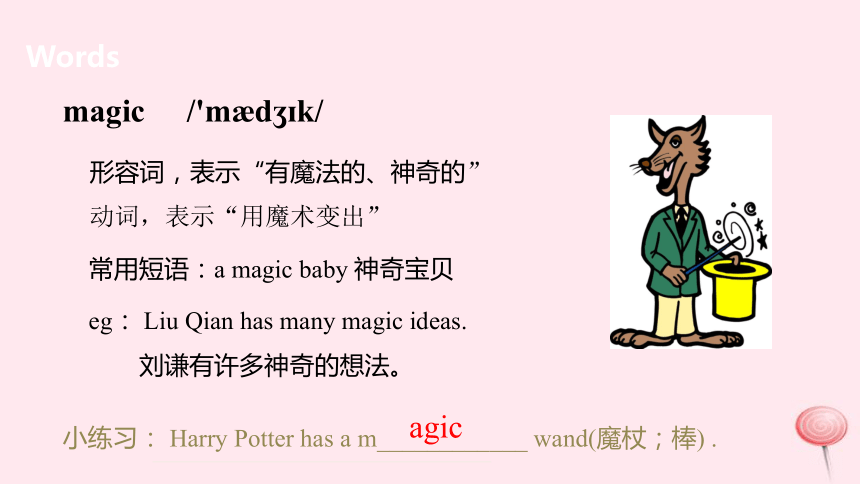
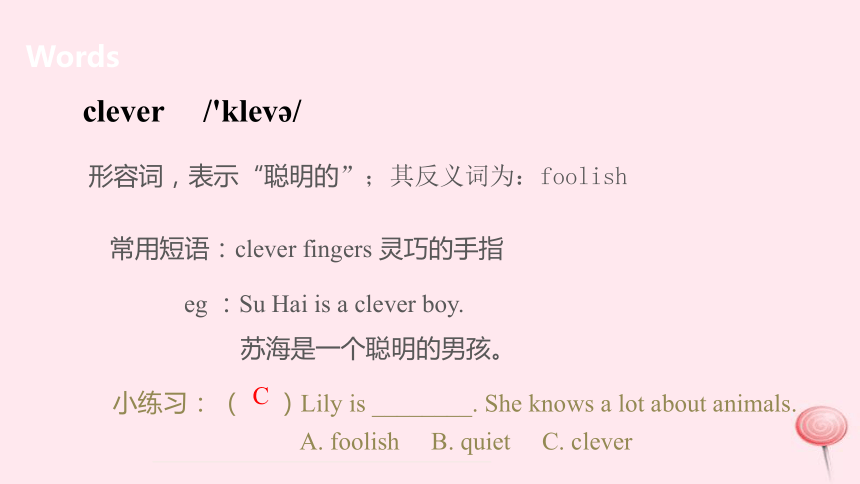
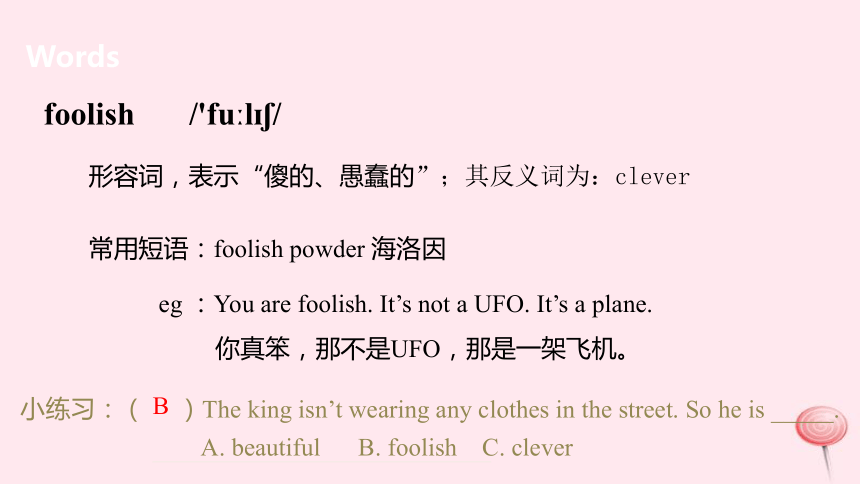
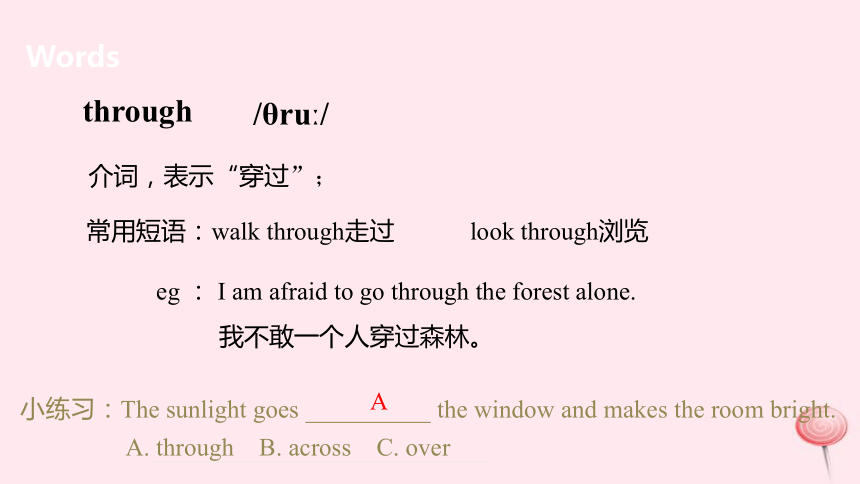
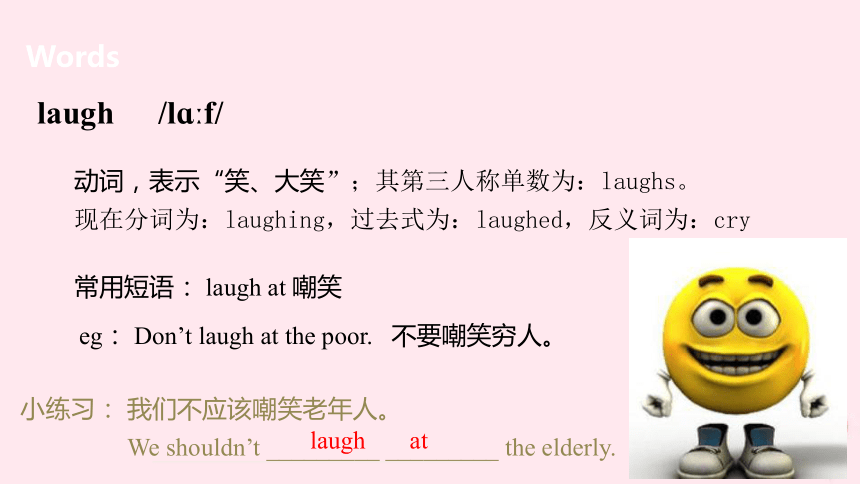
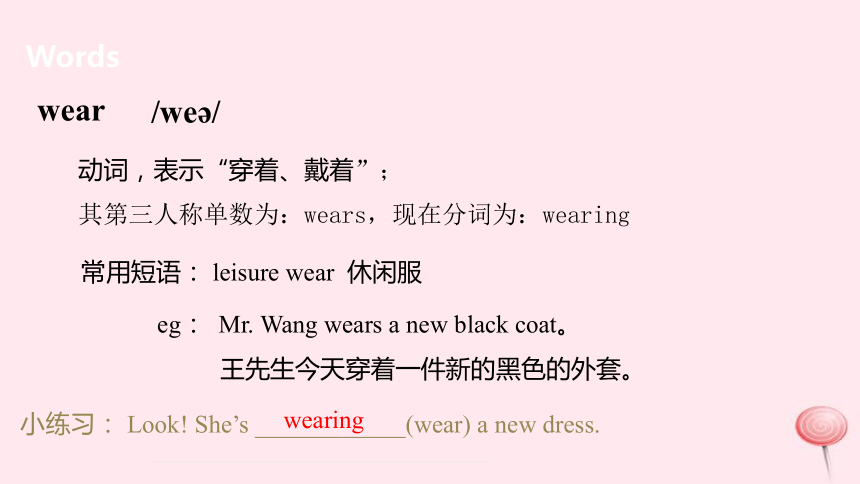
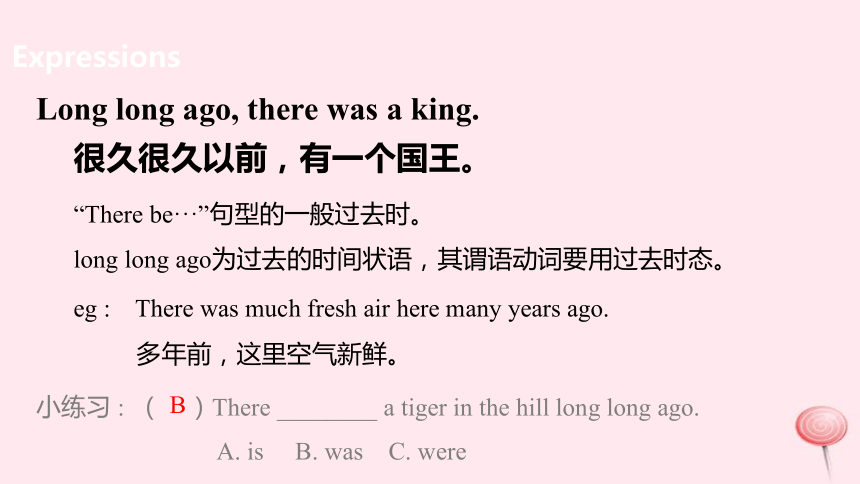
文档简介
(共21张PPT)
Unit 1
The king’s new clothes
Introduce
Answer questions:
I’m very _________.
I like _________ very much.
Who can ________ new clothes for me?
2. Who are they in the story?
3. What did people say?
4. What did the boy say?
Words
形容词,表示“有魔法的、神奇的”
动词,表示“用魔术变出”
常用短语:a magic baby 神奇宝贝
eg: Liu Qian has many magic ideas.
刘谦有许多神奇的想法。
小练习: Harry Potter has a m____________ wand(魔杖;棒) .
agic
magic
/'m?d??k/
Words
形容词,表示“聪明的”;其反义词为:foolish
常用短语:clever fingers?灵巧的手指
eg :Su Hai is a clever boy.
苏海是一个聪明的男孩。
小练习: ( )Lily is ________. She knows a lot about animals.
A. foolish B. quiet C. clever
C
clever
/'klev?/
Words
形容词,表示“傻的、愚蠢的”;其反义词为:clever
常用短语:foolish powder?海洛因
eg :You are foolish. It’s not a UFO. It’s a plane.
你真笨,那不是UFO,那是一架飞机。
小练习:( )The king isn’t wearing any clothes in the street. So he is _____.
A. beautiful B. foolish C. clever
B
foolish
/'fu?l??/
Words
介词,表示“穿过”;
常用短语:walk through走过 look through浏览
eg : I am afraid to go through the forest alone.
我不敢一个人穿过森林。
小练习:The sunlight goes __________ the window and makes the room bright.
A. through B. across C. over
A
through
/θru?/
Words
动词,表示“笑、大笑”;其第三人称单数为:laughs。
现在分词为:laughing,过去式为:laughed,反义词为:cry
常用短语: laugh at 嘲笑
eg: Don’t laugh at the poor. 不要嘲笑穷人。
小练习: 我们不应该嘲笑老年人。
We shouldn’t _________ _________ the elderly.
laugh at
laugh
/lɑ?f/
Words
动词,表示“穿着、戴着”;
其第三人称单数为:wears,现在分词为:wearing
常用短语: leisure wear ?休闲服
eg: Mr. Wang wears a new black coat。
王先生今天穿着一件新的黑色的外套。
小练习: Look! She’s ____________(wear) a new dress.
wearing
wear
/we?/
Expressions
“There be···”句型的一般过去时。
long long ago为过去的时间状语,其谓语动词要用过去时态。
Long long ago, there was a king.
很久很久以前,有一个国王。
eg : There was much fresh air here many years ago.
多年前,这里空气新鲜。
小练习 : ( )There ________ a tiger in the hill long long ago.
A. is B. was C. were
B
Expressions
Make··· for··· 意为“为······制作······”。
We can make new clothes for you.
我们能为你制作新衣服。
eg : They are making a birthday cake for Su Hai.
他们正在给苏海制作生日蛋糕。
小练习 : Tom, make, beautiful, let’s birthday, card, for, a, (.)
__________________________________________________________
Let’s make a beautiful birthday card for Tom.
Expressions
show后通常接双宾语结构,即show sb. sth.,也可以用show sth. to sb.。
The two men showed the king his new clothes.
那两个骗子给国王看他的新衣服。
eg : Wang Bing, show me your homework.
王兵,把你的作业给我看看。
小练习 : Show me your robot, please.
Show your robot _________ __________, please.
to me
Expressions
此句是由what引导的感叹句。
“what+adj.+复数名词/不可数名词”
“what+a/an+adj.+可数名词单数”
What beautiful clothes!
多么漂亮的衣服呀!
eg : What a tall boy! 多么高的男孩呀!
小练习 : 多么酷的玩具车呀!
_________ _________ __________ toy car!
What a cool
Dialogue
Talk about the stories with cheating you know.
Expand
through是介词,表示从某一范围的一端到另一端
但它表示的动作是在内部空间进行的,往往指穿过沙漠、森林、窗户等。
through/across/over/past的用法区别
eg : The river runs through the city.??????这条河从这座城市中间流过。
Expand
2) across是介词,强调从一定范围的一边到另一边,且在物体表面上或沿着某一条线的方向而进行的动作。
through/across/over/past的用法区别
eg : ?Go across the bridge,and you’ll find the park.??????
越过这座桥,你就会找到公园。
Expand
3) over是介词,用作“穿过、通过”时,表示到达高的障碍物(如树、墙、篱笆和山脉等)的另一侧。
through/across/over/past的用法区别
eg : ?He jumped over the wall.??????他跳过了墙。
4) past也是介词,指从某物旁边经过,意思是“走过某处、经过……”。
eg : ? He walked past me without saying “Hello”.?????
他没打招呼就从我身边走过。
Summary
magic clever foolish
through laugh wear
There was… show sb sth
make… for… what a/an …
Exercise
This is the ______ chair.
A. king’s B. kings’ C. king
2. Let me make a puppet _____ you.
A. with B. to C. for
A
C
Exercise
3. Mr. Smith some beautiful stamps us this morning.
A. showed, for B. showed, to C. shows, to
4. There are a lot of ______ in the classroom.
A. a people B. peoples C. people
B
C
Exercise
5. ______ beautiful clothes!
A. What B. What’s C. How
6.The king a special hobby. He new clothes.
A. had , likes wear B. had, liked wearing C. had, liked wear
A
B
Homework
Complete story framework alone and recite the article.
Unit 1
The king’s new clothes
Introduce
Answer questions:
I’m very _________.
I like _________ very much.
Who can ________ new clothes for me?
2. Who are they in the story?
3. What did people say?
4. What did the boy say?
Words
形容词,表示“有魔法的、神奇的”
动词,表示“用魔术变出”
常用短语:a magic baby 神奇宝贝
eg: Liu Qian has many magic ideas.
刘谦有许多神奇的想法。
小练习: Harry Potter has a m____________ wand(魔杖;棒) .
agic
magic
/'m?d??k/
Words
形容词,表示“聪明的”;其反义词为:foolish
常用短语:clever fingers?灵巧的手指
eg :Su Hai is a clever boy.
苏海是一个聪明的男孩。
小练习: ( )Lily is ________. She knows a lot about animals.
A. foolish B. quiet C. clever
C
clever
/'klev?/
Words
形容词,表示“傻的、愚蠢的”;其反义词为:clever
常用短语:foolish powder?海洛因
eg :You are foolish. It’s not a UFO. It’s a plane.
你真笨,那不是UFO,那是一架飞机。
小练习:( )The king isn’t wearing any clothes in the street. So he is _____.
A. beautiful B. foolish C. clever
B
foolish
/'fu?l??/
Words
介词,表示“穿过”;
常用短语:walk through走过 look through浏览
eg : I am afraid to go through the forest alone.
我不敢一个人穿过森林。
小练习:The sunlight goes __________ the window and makes the room bright.
A. through B. across C. over
A
through
/θru?/
Words
动词,表示“笑、大笑”;其第三人称单数为:laughs。
现在分词为:laughing,过去式为:laughed,反义词为:cry
常用短语: laugh at 嘲笑
eg: Don’t laugh at the poor. 不要嘲笑穷人。
小练习: 我们不应该嘲笑老年人。
We shouldn’t _________ _________ the elderly.
laugh at
laugh
/lɑ?f/
Words
动词,表示“穿着、戴着”;
其第三人称单数为:wears,现在分词为:wearing
常用短语: leisure wear ?休闲服
eg: Mr. Wang wears a new black coat。
王先生今天穿着一件新的黑色的外套。
小练习: Look! She’s ____________(wear) a new dress.
wearing
wear
/we?/
Expressions
“There be···”句型的一般过去时。
long long ago为过去的时间状语,其谓语动词要用过去时态。
Long long ago, there was a king.
很久很久以前,有一个国王。
eg : There was much fresh air here many years ago.
多年前,这里空气新鲜。
小练习 : ( )There ________ a tiger in the hill long long ago.
A. is B. was C. were
B
Expressions
Make··· for··· 意为“为······制作······”。
We can make new clothes for you.
我们能为你制作新衣服。
eg : They are making a birthday cake for Su Hai.
他们正在给苏海制作生日蛋糕。
小练习 : Tom, make, beautiful, let’s birthday, card, for, a, (.)
__________________________________________________________
Let’s make a beautiful birthday card for Tom.
Expressions
show后通常接双宾语结构,即show sb. sth.,也可以用show sth. to sb.。
The two men showed the king his new clothes.
那两个骗子给国王看他的新衣服。
eg : Wang Bing, show me your homework.
王兵,把你的作业给我看看。
小练习 : Show me your robot, please.
Show your robot _________ __________, please.
to me
Expressions
此句是由what引导的感叹句。
“what+adj.+复数名词/不可数名词”
“what+a/an+adj.+可数名词单数”
What beautiful clothes!
多么漂亮的衣服呀!
eg : What a tall boy! 多么高的男孩呀!
小练习 : 多么酷的玩具车呀!
_________ _________ __________ toy car!
What a cool
Dialogue
Talk about the stories with cheating you know.
Expand
through是介词,表示从某一范围的一端到另一端
但它表示的动作是在内部空间进行的,往往指穿过沙漠、森林、窗户等。
through/across/over/past的用法区别
eg : The river runs through the city.??????这条河从这座城市中间流过。
Expand
2) across是介词,强调从一定范围的一边到另一边,且在物体表面上或沿着某一条线的方向而进行的动作。
through/across/over/past的用法区别
eg : ?Go across the bridge,and you’ll find the park.??????
越过这座桥,你就会找到公园。
Expand
3) over是介词,用作“穿过、通过”时,表示到达高的障碍物(如树、墙、篱笆和山脉等)的另一侧。
through/across/over/past的用法区别
eg : ?He jumped over the wall.??????他跳过了墙。
4) past也是介词,指从某物旁边经过,意思是“走过某处、经过……”。
eg : ? He walked past me without saying “Hello”.?????
他没打招呼就从我身边走过。
Summary
magic clever foolish
through laugh wear
There was… show sb sth
make… for… what a/an …
Exercise
This is the ______ chair.
A. king’s B. kings’ C. king
2. Let me make a puppet _____ you.
A. with B. to C. for
A
C
Exercise
3. Mr. Smith some beautiful stamps us this morning.
A. showed, for B. showed, to C. shows, to
4. There are a lot of ______ in the classroom.
A. a people B. peoples C. people
B
C
Exercise
5. ______ beautiful clothes!
A. What B. What’s C. How
6.The king a special hobby. He new clothes.
A. had , likes wear B. had, liked wearing C. had, liked wear
A
B
Homework
Complete story framework alone and recite the article.
